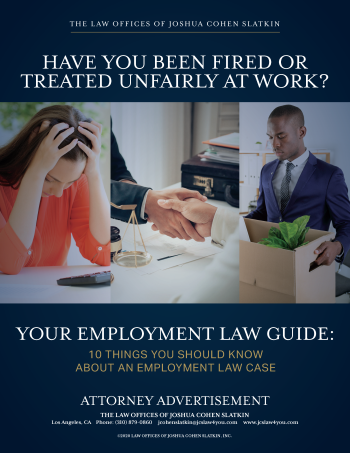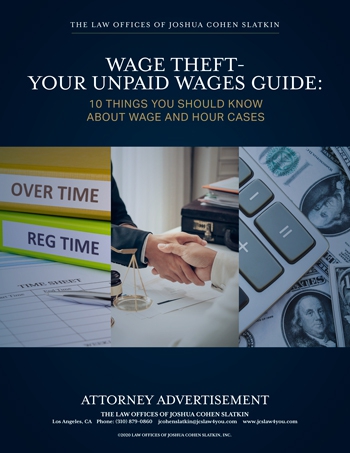Making ends meet isn’t easy, especially when your employer is trying to save money at your expense. There are several common ways that employers are in violation of state and federal wage and hour laws. This is “wage theft.”
Unpaid wages include:
- Paying workers less than the minimum hourly wage
- Failing to pay overtime for hours worked in excess of 8 hours in a day or in excess of 40 hours in a workweek or double-time pay for work performed in excess of 12 hours in a day
- Requiring workers to work through meal or rest breaks
- Misclassifying employees as independent contractors to avoid complying with wage and hour laws
- Requiring workers to work “off the clock” before and after their scheduled workday
- Failing to pay all owed and earned wages when the employee stops working for the employer
- Failing to provide accurate and itemized wage statements
If you have been the victim of this type of wage theft, it is vital that you understand how to protect your legal right to collect your earned wages.
California offers employees a path to recover their owed unpaid wages. If you believe your employer is violating wage and hour laws, the wage and hour team at JCS Law Firm can help. Even if you are only owed a small amount in wages but work for a company with many employees, you may be able to hold your employer accountable through a wage and hour class action. We have the experience and resources to handle class action matters for unpaid wages. Even if you believe that the dollar amount of your unpaid wage claim is small, we can discuss your legal options.
How Employers Violate California’s Wage and Hour Laws
Common violations of California and federal wage and hour laws include the following:
1. California Minimum Wage Violations
California’s minimum wage is higher than the federal law requirement. As of 2020, the minimum wage is $13/hour for employers with 26 or more employees and $12/hour for employers with fewer than 26 employees. Some municipalities, such as Los Angeles, set an even higher minimum wage. The minimum wage in Los Angeles is $15/hour for employers with 26 or more employees and $14.25 for employers with fewer than 26 employees.
Sadly, some employers do not pay this minimum wage or try to find loopholes to avoid paying their employees the full minimum wage. Some employers may pay workers a salary but expect them to work so many hours that their effective per-hour rate does not equal the minimum wage and/or doesn’t compensate them for overtime pay. Others may expect employees to work “off the clock” during breaks or before and after they clock in. These employers are in violation of the law and should be held accountable.
2. Violations in Overtime Pay
If you are working overtime, there are specific California laws for overtime pay scales:
- Time-and-a-half pay for any work over 40 hours in a workweek
- Time-and-a-half pay for working over eight hours in a single day
- Time-and-a-half pay for the first eight hours on the seventh workday in a row
- Double time for working more than 12 hours in a single day
- Double time for any work after the first eight hours on the seventh workday in a row
Employers may violate state laws by paying only time-and-a-half pay when workers are owed double time instead. Some employers may refuse to pay earned overtime wages, while others avoid the extra pay by misclassifying employees as independent contractors rather than regular employees. All of these scenarios are illegal.
3. Employee Misclassifications
Some workers are exempt from overtime pay and the wage and hour laws. These include independent contractors and what are known as exempt employees. However, some employers misclassify workers as independent contractors rather than as an employee to avoid payroll taxes and to avoid paying overtime/double time and minimum wages. Independent contractors are “exempt employees,” which means they are not entitled to overtime and other wage and hour law protections. Employers may take advantage of these exemptions by misclassifying workers as independent contractors when they should have the full benefits of California state and federal wage and hour laws.
“Exempt Employees” may include:
- Executives
- Administrative workers (e.g., administrative assistants)
- Highly-compensated, high earning employees
- Learned professionals (e.g., registered nurses, doctors, teachers, lawyers, etc.)
- Computer professionals
- Outside sales employees
Non-exempt employees who may qualify for overtime include:
- Tipped employees (e.g. servers and bartenders)
- Mechanics
- Manual laborers and other hourly-paid workers
- First responders (e.g., police officers, firefighters, paramedics, etc.)
To determine whether you are an exempt employee, consider your position, your job duties, and how much you make. Exempt employees must make more than $960 a week ($49,920 a year) and perform exempt duties.
Examples of exempt duties include:
- Managing a company or department (executive exemption)
- Performing office work that directly affects the company (administrative exemption)
- Performing work that requires advanced knowledge (professional exemption)
- Making sales (outside sales exemption)
- Systems analysis (computer employee exemption)
Meal and Rest Break Violations
California law requires employers to offer duty-free meal breaks. A meal break within the first five hours, after the beginning of an employee’s shift, is required by law. Employers must also offer a ten-minute rest break during a shift that lasts between three and a half and six hours and another ten-minute break for shifts that last between six and ten hours. Employers who do not offer these breaks or require their employees to perform job tasks during their breaks are in violation of state law. These employers may be responsible for repaying employees’ unpaid wages.
How Do I File a Claim for Unpaid Wages in Los Angeles County?
JCS Law Firm can help you file a lawsuit against your employer to seek damages for your unpaid wages. We litigate unpaid wage claims by reviewing documentation of your hours and wages. We put together all available evidence so we can establish that your employer broke the law and owes you unpaid wages.
Request our free e-book, Your Unpaid Wages Guide: 10 Things You Should Know About Wage and Hour Cases, to learn about your rights.
Additional evidence that may help prove your case includes:
- Internal company policies
- Internal company memos and other correspondence
- Testimony from coworkers
- Surveillance video of employees working off the clock
- Time clock data
- Pay stubs
- All records of your hours worked
California law gives you three years to file a claim for unpaid wages. This means you have a three year period to file a claim from the time the last violation occurred. Claims for unpaid wages can go back as far as four years based on laws relating to unfair business practices. This time limit for filing a claim is one reason it is important to talk to us as soon as possible. In addition to preparing your claim and managing the process, we will ensure that you do not miss these important deadlines.
We understand the tactics employers use to violate wage and hours laws and work to help employees recover all the compensation they earned. The value of your claim depends on the amount of unpaid wages your employer owes you. We will analyze your case to determine its value and collect all available evidence to build a solid case that proves your employer’s liability. Do not wait to contact us. You may be worried that your employer will punish you in some way for seeking to get your unpaid wages. We will protect your rights if your employer attempts to retaliate against you for filing a wage and hour claim.
If you have been the victim of wage theft, you have options to help you collect the full value of your earnings. Fill out our contact form or call us today at (833) JCS-FIRM (527-3476) to schedule a free case evaluation.








